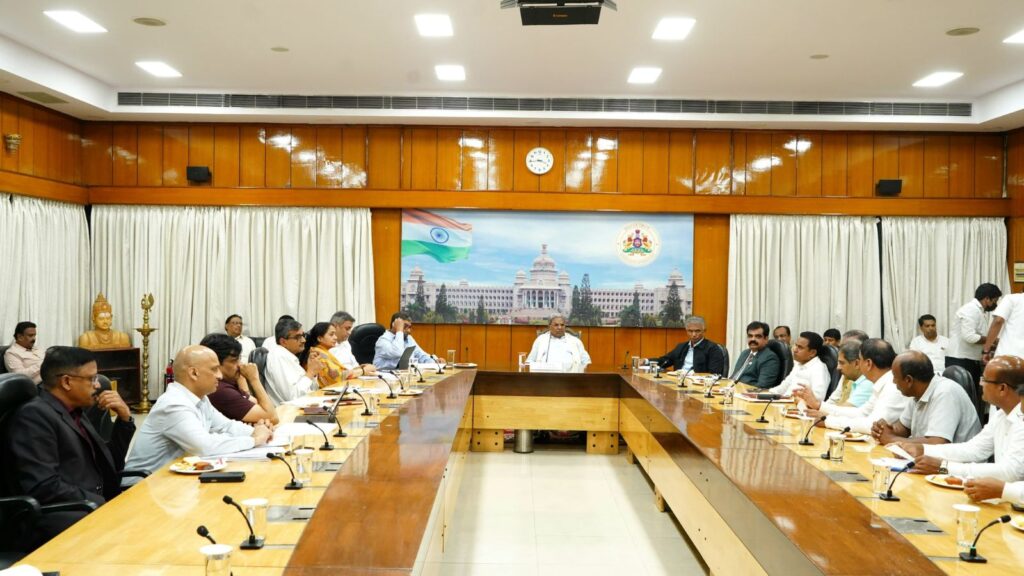Small vendors and traders in Bengaluru, who have been protesting the Goods and Services Tax (GST) notices issued by the state commercial tax department to those conducting transactions of over ₹ 40 lakh per annum through UPI, have called off their strike on Thursday following a meeting with Karnataka Chief Minister Siddaramaiah.
“Trade bodies confirmed they have not supported any bandhs and agreed to withdraw planned protests following the chief minister’s assurances. The government reiterated its focus on empowering small traders and boosting purchasing power through various programmes,” the chief minister’s office said after the meeting with trade bodies, including the Federation of Karnataka Chambers of Commerce and Industry (FKCCI), on Wednesday.
The proposed GST on small vendors—such as bakeries, tea and coffee sellers, chaat vendors, etc.—had sparked concerns over the last fortnight. Many had stopped UPI transactions and sought cash following rumours that authorities were likely to retrospectively impose GST on their previous sales.
At the meeting, trade representatives raised concerns over the confusion regarding GST for small traders, including loan amounts and personal transactions, and urged the state government to allow traders to directly resolve issues with the commercial tax department. The traders also sought a helpline, awareness programmes to clarify GST regulations, and a “one-time waiver of old tax arrears”.
Siddaramaiah clarified at the meeting that “notices were issued only to traders with UPI transactions exceeding Rs 40 lakh” to trigger GST registrations and announced that old tax arrears would not be pursued if traders register under the GST and start paying the tax in the future.
Siddaramaiah also told the trade bodies that “no taxes would be collected from traders dealing in exempt goods like milk, vegetables, meat, and fruits, but those liable under the law must comply”.
Chief Minister Shri @siddaramaiah held a meeting with representatives of trade unions today regarding the recent GST notices issued to small businesses, and later addressed the media to clarify the issue and share the government’s stance.
• Representatives from various trade… pic.twitter.com/I3bqBe7cAy
— CM of Karnataka (@CMofKarnataka) July 23, 2025
“Karnataka ranks second in India for GST collection and shares 50 per cent of the revenue with the central government, as decided by the GST Council chaired by the Union finance minister,” Siddaramaiah said.
The representatives of the trade bodies were told that “only 9,000 notices have been issued and spread over 2-3 years which comes to around 18,000 notices”.
Story continues below this ad
Completely illegal: BJP hits out
The state government’s move to issue GST notices to small-scale traders had resulted in a war of words between the ruling Congress and the Opposition BJP and JD(S) in Karnataka.
“With the Congress government’s treasury running dry, the CM has unleashed the commercial taxes department to issue these notices in a bid to raise money. The notices served on street vendors and small businesses are completely illegal. The government must immediately stop issuing them and withdraw those already sent,” B Y Vijayendra, state BJP president, said at the party office this week.
Former BJP chief minister Basavaraj Bommai also accused Siddaramaiah of trying to blame the Centre for the GST notices to small vendors. “The GST Council is a joint responsibility of both the state and the Centre, but the major responsibility lies with the state. The implementation and administration are handled by the state’s commercial tax department. Issuing notices to small traders has now disrupted their businesses severely,” Bommai said. “As the finance minister, Siddaramaiah must resolve this issue and also ensure a lawful and practical framework is provided for traders to pay taxes in the future,” he added.
Earlier, Karnataka Deputy Chief Minister D K Shivakumar had claimed that the GST notices were being issued by the Centre, but the blame for it was being planted on the state. “The BJP government at the Centre fixed a turnover limit of ₹ 40 lakh for the GST registration and also instructed the state governments to follow it. The GST office has issued notices to about 14,000 traders, including tender coconut, flower, vegetable vendors. Our leader Rahul Gandhi had opposed the GST in the past,” Shivakumar stated.
Story continues below this ad
Asked if notices had been issued in view of the tax collection targets given by Siddaramaiah, he said, “The officials are following the rules set by the Centre’s GST Council. These notices have been issued due to the pressure from the Central GST Council.”


